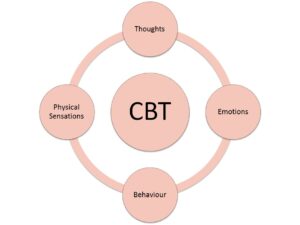Are you struggling with persistent and intrusive thoughts that just won’t go away? Do these thoughts interfere with your daily life, causing anxiety and distress? If so, you’re not alone. Obsessive thoughts affect millions of people worldwide, and they can be incredibly challenging to manage on your own. However, Cognitive Behavioral Therapy (CBT) has emerged as a potential treatment option for obsessive thinking. In this blog post, we’ll explore the effectiveness of CBT for obsessive thoughts and whether it’s the best treatment for managing them. So let’s dive in!
Contents
What is CBT?
 Cognitive behavioural therapy (CBT) is a form of psychotherapy that helps people change their thinking and behaviour patterns. CBT is based on the idea that our thoughts, feelings, and behaviours are all interconnected, and that our thoughts can affect our emotions and vice versa. CBT has been shown to be effective in treating a variety of mental health conditions, including anxiety disorders, depression, eating disorders, substance abuse disorders, and more.
Cognitive behavioural therapy (CBT) is a form of psychotherapy that helps people change their thinking and behaviour patterns. CBT is based on the idea that our thoughts, feelings, and behaviours are all interconnected, and that our thoughts can affect our emotions and vice versa. CBT has been shown to be effective in treating a variety of mental health conditions, including anxiety disorders, depression, eating disorders, substance abuse disorders, and more.
Obsessive thoughts are persistent, unwanted thoughts or images that can cause distress and interfere with daily life. Obsessive thoughts are common symptoms of anxiety disorders, such as generalized anxiety disorder, social anxiety disorder, and panic disorder. While everyone experiences intrusive thoughts from time to time, people with anxiety disorders typically find them difficult to control or manage.
CBT has been found to be an effective treatment for obsessive thoughts. It helps people learn how to identify and challenge their negative thinking patterns. CBT also teaches people how to develop healthy coping strategies for dealing with intrusive thoughts.
What are obsessive thoughts?
Most people have experienced intrusive, repetitive, and unwanted thoughts at some point in their lives. However, for some people, these thoughts become so frequent and persistent that they start to interfere with daily life. When this happens, it’s known as obsessive thinking, and it can be a symptom of an underlying mental health condition like OCD or anxiety.
Cognitive behavioural therapy (CBT) is a type of psychotherapy that has been shown to be effective in treating obsessive thoughts. CBT works by helping you to identify and challenge the negative beliefs and thought patterns that are causing your obsessions. It also teaches you coping and problem-solving skills to deal with intrusive thoughts in a more constructive way.
How does CBT help with obsessive thoughts?

Cognitive behavioural therapy (CBT) is a type of psychotherapy that helps people change their thoughts and behaviours. People who have obsessive thoughts may benefit from CBT.
CBT can help people with obsessive thoughts in several ways. First, CBT can help people identify and challenge their negative and distorted thinking patterns. Second, CBT can help people learn how to manage and cope with their obsessions and compulsions. Third, CBT can help people develop healthy coping mechanisms for dealing with stress and anxiety. Fourth, CBT can help people build a support network of friends or family members who can provide emotional support.
If you are struggling with obsessive thoughts, CBT may be an effective treatment option for you. Talk to your doctor or mental health professional about whether CBT is right for you.
When should you consider CBT for obsessive thoughts?
 Cognitive behavioural therapy (CBT) is a type of psychotherapy that can be effective in treating a wide range of mental health conditions, including obsessive thoughts. CBT focuses on helping people to change the way they think and behave in order to improve their emotional well-being.
Cognitive behavioural therapy (CBT) is a type of psychotherapy that can be effective in treating a wide range of mental health conditions, including obsessive thoughts. CBT focuses on helping people to change the way they think and behave in order to improve their emotional well-being.
There are many different types of obsessions, but they all involve having persistent, intrusive, and unwanted thoughts that cause anxiety or distress. People with obsessions often try to control or suppress their thoughts, but this only leads to more distress and anxiety. CBT can help people to learn how to manage their obsessions by changing the way they think about them.
CBT is usually provided by a trained therapist in individual or group sessions. It typically lasts for 12-20 weeks, although some people may need more or less time depending on the severity of their condition. If you are considering CBT for your obsessive thoughts, it is important to find a therapist who is experienced in treating this condition.
What are the side effects of CBT?
Most people who undergo CBT for obsessive thoughts report feeling better after just a few sessions. However, as with any treatment, there are also potential side effects. These can include feeling worse before feeling better, feeling more anxious at first, or feeling like your thoughts are out of control. If you experience any of these side effects, it’s important to talk to your therapist about them so they can help you manage them.
Is CBT the best treatment for OCD?
There is a lot of debate surrounding the best treatment for OCD, with many different therapies and approaches being touted as the ‘cure’. However, one therapy that has been shown to be consistently effective in treating OCD is Cognitive Behavioural Therapy (CBT).
CBT is a talking therapy that helps you to change the way you think and behave. It can be used to treat a wide range of mental health problems, including OCD. CBT works by helping you to challenge and change any negative or unhelpful thoughts and behaviours that are contributing to your OCD.
One of the main reasons why CBT is such an effective treatment for OCD is that it teaches you how to manage and cope with your obsessions and compulsions in a more positive way. This can help to reduce the impact that OCD has on your life, and eventually lead to complete recovery.
If you are considering CBT as a treatment for your OCD, then it is important to find a therapist who is experienced in treating this condition. If you would like more information on finding a therapist, or on CBT in general, then please do not hesitate to get in touch.
Conclusion
Cognitive Behavioral Therapy (CBT) is a proven treatment for obsessive-compulsive disorder and other mental health issues, including obsessive thoughts. CBT helps you recognize patterns in your thoughts and behaviour that may be causing or exacerbating your symptoms, so you can learn to modify them. While it’s important to find the ideal treatment plan for each individual, research suggests that CBT might provide effective relief from OCD symptoms and could potentially be the best starting point when seeking help for managing obsessive thoughts.
For more information and guidance, please contact OCDMantra. OCD is a mental health disorder characterized by obsessions and compulsions. If you have any queries regarding OCD treatment, OCD Counseling, ERP therapy experienced therapists at OCDMantra can help: Book a trial OCD therapy session


